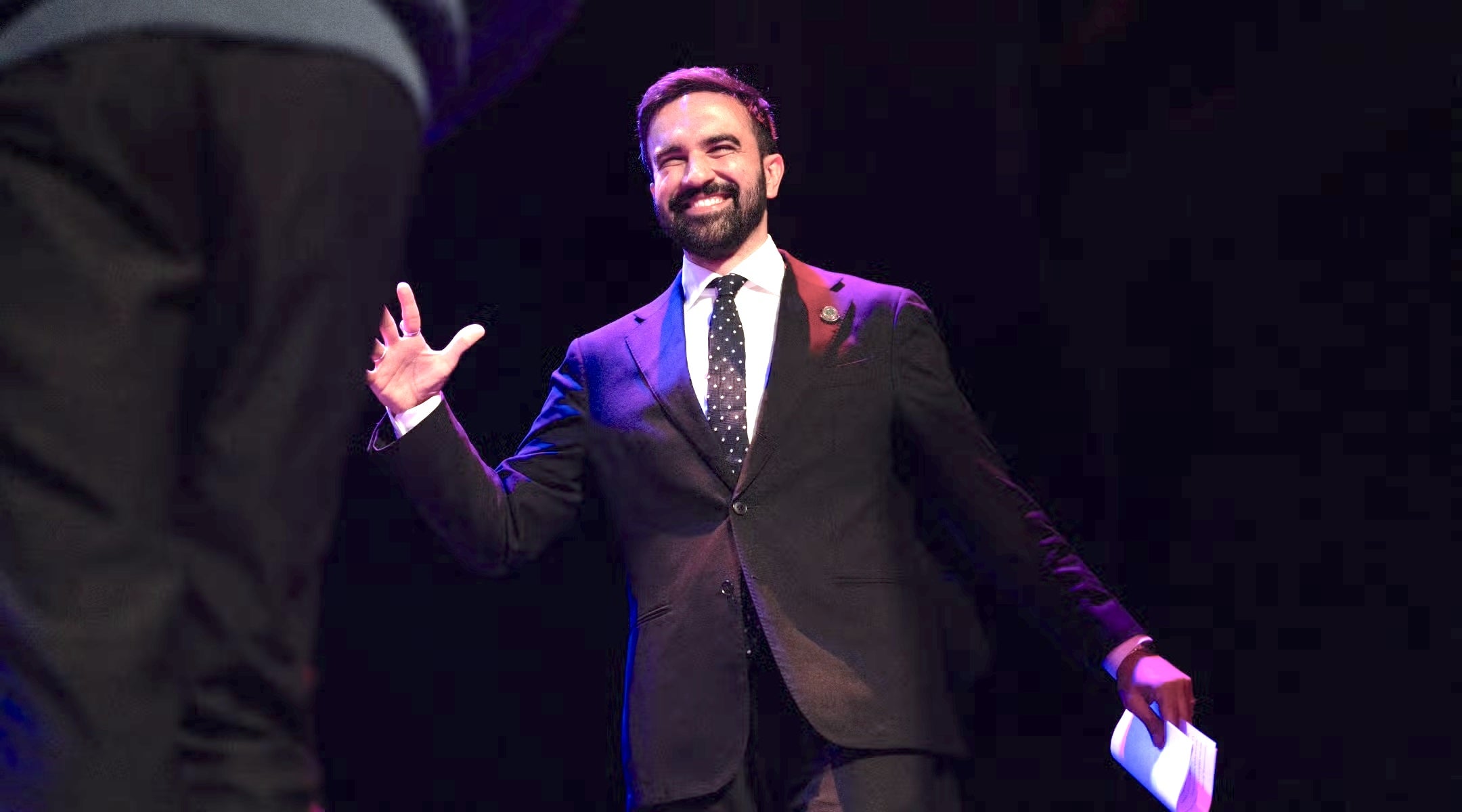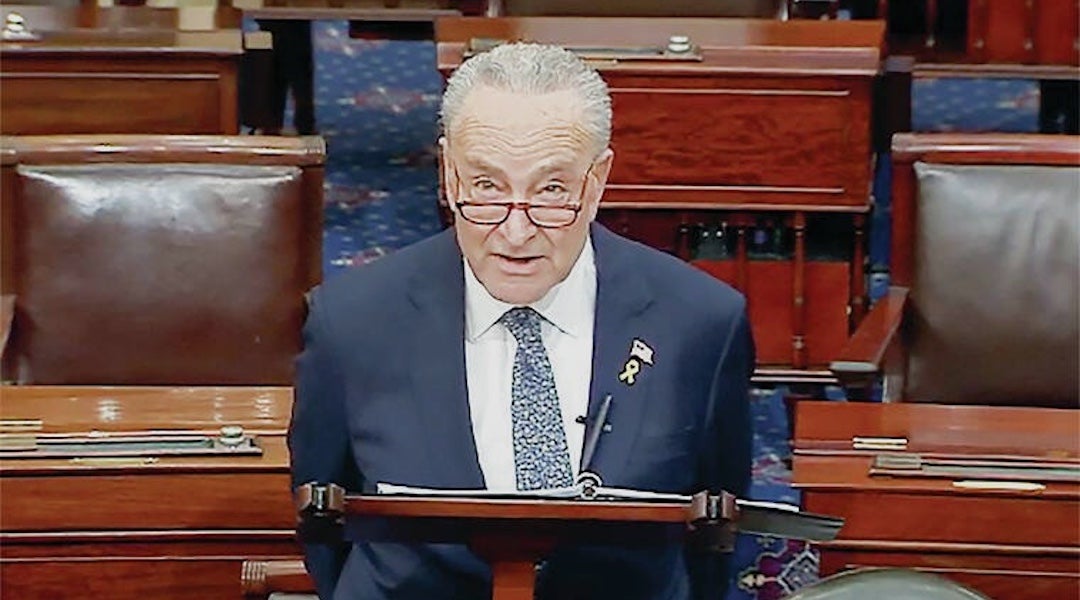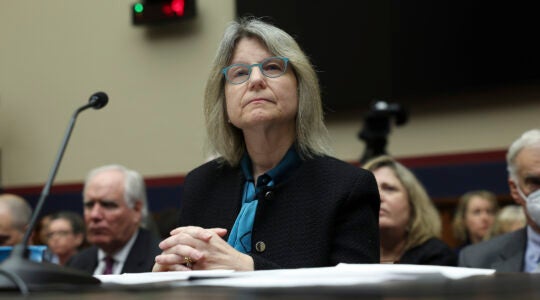It’s a good thing Chuck Schumer loves pickles — because he’s in a real big one following Zohran Mamdani’s apparent victory in New York’s Democratic mayoral primary last week.
The Senate Minority Leader’s Biden-y vibes (pro-Israel moderate) and vintage (74 years old) were already shaping up to be big problems for him in a potential 2028 primary challenge from Rep. Alexandria Ocasio-Cortez, the progressive powerhouse from the Bronx who campaigned for Mamdani. If Schumer fails to get behind Mamdani, it will galvanize progressive opposition — not only to his re-election, but quite possibly his leadership of the Democratic caucus in the Senate.
The problem for Schumer is that anything resembling an endorsement — or, to use the technical term, kashering — of Mamdani will outrage many of his longtime political supporters in the Jewish community, who see Mamdani as mainstreaming the sort of pro-Palestinan politics that villainizes Israel and endangers Jews. They expect him to take the lead in sticking up for Israel and speaking out against antisemitism.
On this last point, Schumer the senator has only Schumer the shomer to blame.
When Schumer took to the Senate floor in March 2024 to deliver a major speech on the war in Gaza and the Israel political landscape, he broke out his favorite Hebrew lesson to make clear that he was speaking as more than just an elected official.
“My last name is Schumer, which derives from the Hebrew word shomer, or ‘guardian,’” Schumer said. “Of course, my first responsibility is to America and to New York. But as the first Jewish Majority Leader of the United States Senate, and the highest-ranking Jewish elected official in America ever, I also feel very keenly my responsibility as a shomer yisroel — a guardian of the People of Israel.”
In his speech, Schumer strongly condemned Hamas, blaming it for the war and much of the devastation in Gaza, and called for the replacement of Mahmoud Abbas as leader of the Palestinian Authority. The biggest news, however, was his call for new Israeli elections, arguing that Prime Minister Benjamin Netyanhu and the far-right members of his cabinet had also become “obstacles to peace.”
Schumer took up the shomer mantle again this past March, turning his sentinel gaze to the U.S., with the release of his book “Antisemitism in America: A Warning.”
With the combination of his Senate speech and new book, Schumer has positioned himself as a leading voice on what’s good (and bad) for the Jews — in New York, America and Israel. So one would think Schumer would have had something to say about the raging Jewish debate over Mamdani. Instead, his statement after Mamdani’s upset victory in the New York City mayoral primary treated the topic like a loaf of rye bread on Passover.
“I have known @ZohranKMamdani since we worked together to provide debt relief for thousands of beleaguered taxi drivers & fought to stop a fracked gas plant in Astoria,” Schumer posted on X the morning after the election. “He ran an impressive campaign that connected with New Yorkers about affordability, fairness, & opportunity.” Schumer added: “I spoke with @ZohranKMamdani this morning and am looking forward to getting together soon.”
Schumer’s avoidance of the very topic that had riled so many pro-Israel supporters stood in sharp contrast to several other New York lawmakers.
Rep. Jerry Nadler of the very Jewish Upper West Side went so far as to endorse Mamadani in the November election – but even there, he addressed the antisemitism concerns. He told The New York Times that he had spoken with Mamdani and came away reassured. “I’ve spoken to him today about his commitment to fighting antisemitism, and we’ll work with all New Yorkers to fight against all bigotry and hate,” said Nadler. In a follow-up story on how the race is dividing the Jewish community, Nadler was quoted as saying that the election “results show that most Jews, at least in New York City, at least in my district, agree he’s not antisemitic.”

New York City mayoral candidate Zohran Mamdani arrives onstage at a Brooklyn rally in May 2025. (Madison Swart and Hans Lucas via AFP/Getty Images)
On the flip side, it was New York’s upstate junior senator, Kirsten Gillibrand, giving voice to the Jews in Schumer’s old Brookly congressional district and the rest of the city who are worried about Mamdani. She told WNYC that she was not yet ready to endorse Mamdani, and criticized him for failing to condemn the phrase “globalize the intifada” in an interview prior to the primary vote.
“As a leader of a city as diverse as New York City, with 8 million people, as the largest Jewish population in the country, he should denounce it,” Gillibrand said. “That’s it. Period. You can’t celebrate it. You can’t value it. You can’t lift it up.”
“When you hear things like intifada, when you hear things like jihad, when you hear ‘from the river to the sea,’ it is received as slaughter the Jews and destroy Israel. Period. It’s how it’s received,” Gillibrand continued. “If you want to be a leader, you have to recognize how these things are felt and received.”
What makes things extra tricky for Schumer — assuming he plans to endorse, or at least not doing anything to oppose, Mamdani — is that Gillibrand could have been taking a page right out of his book. Literally.
“Other frequently used expressions such as ‘globalize the intifada’ sound to many of us like a call to not only kill the Jews in Israel, but to kill all the Jews worldwide,” Schumer wrote in “Antisemitism in America.”
When repeatedly pressed in an interview Sunday on “Meet The Press” if he would condemn the phrase, Mamdani did not directly answer the question, but said “that’s not language that I use.”
“I’ve heard those fears [of Jewish New Yorkers], and I’ve had those conversations, and ultimately, they are part and parcel of why in my campaign, I’ve put forward a commitment to increase funding for anti-hate crime programming by 800%,” Mamdani said. He added: “I don’t believe that the role of the mayor is to police speech,” but also pledged to “root out” antisemitism.
In his book, Schumer raised several other concerns that could apply to Mamdani.
Mamdani regularly accuses Israel of genocide — a claim Schumer not only rejected, but said strikes the “vast majority” of American Jews as “painful, cruel, unfair and vicious.”
“It creates the impression that Israel is monstrous, and therefore Jewish supporters of Israel might be monsters, too,” Schumer said. “Antisemitism, once again, could lie just around the bend.”
While Mamdani said during the campaign that Israel has a right to exist, he demurred on whether that applied to its status as a Jewish state. He affiliates with the anti-Zionist Democratic Socialists of America. Schumer wrote in his book that denying the Jewish people a right to their own state qualified as antisemitism.
Mamdani has said that he would have Netanyahu arrested if he attempted to come to New York City, even though the U.S. is not a party to the International Criminal Court, which issued a warrant for the Israeli leader’s arrest. Schumer took to the Senate floor to call the ICC warrant “profoundly unfair” and “reprehensible” and accused the court of decades-long anti-Israel bias.
Mamdani supports the anti-Israel boycott, divestment and sanctions movement. Schumer has called BDS a “modern version of anti-Semitism.”
Even while warning about these issues and the need to speak out on them, Schumer also cautioned in his book against rushing to brand people as antisemites.
“[W]e must be careful not to permanently condemn as an antisemite every single person who might use language that many Jewish-Americans consider over the line,” Schumer said. “Many have little idea of what these slogans, phrases, and words imply; what they entail; and how dangerous they can be.”
He also waxed nostalgic about several previous attempts to find common ground between far-left and establishment liberals, and warned that unfair accusations of antisemitism “make it even harder to have a constructive dialogue about these emotional and complex issues.”
Whether Schumer sticks with sweet or goes sour with Mamdani, it’s hard to see how he doesn’t end up over a barrel on this one.
JTA has documented Jewish history in real-time for over a century. Keep our journalism strong by joining us in supporting independent, award-winning reporting.






